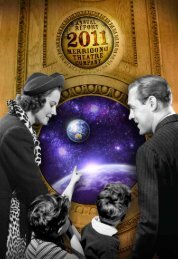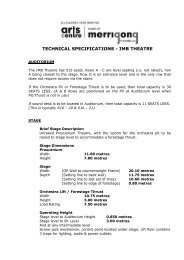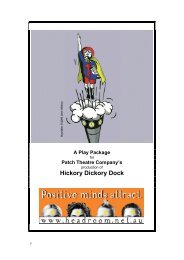FAUSTUS
hell = bUy now x pAy lATer - Bell Shakespeare
hell = bUy now x pAy lATer - Bell Shakespeare
You also want an ePaper? Increase the reach of your titles
YUMPU automatically turns print PDFs into web optimized ePapers that Google loves.
hell = buy now x pay later<br />
<strong>FAUSTUS</strong><br />
ONLINE LEARNING PACK<br />
National Education<br />
& Youth Partner
CONTENTS<br />
ABOUT BELL SHAKESPEARE 2<br />
<strong>FAUSTUS</strong> 2011 3<br />
CAST AND CREATIVES<br />
SYNOPSIS OF THE TRAGICALL HISTORY OF DR <strong>FAUSTUS</strong> BY<br />
CHRISTOPHER MARLOWE<br />
4<br />
5<br />
SYNOPSIS OF FAUST: THE FIRST PART OF THE TRAGEDY OF JOHANN<br />
WOLFGANG VON GOETHE<br />
CHARACTERS 7<br />
6<br />
BACKGROUND 8<br />
MARLOWE, GOETHE, MILTON AND DRYDEN 9<br />
INTERVIEW WITH DIRECTOR MICHAEL GOW 11<br />
THE DESIGN 15<br />
PRE- AND POST- PERFORMANCE ACTIVITIES 20<br />
THANK YOU TO OUR PARTNERS 24
ABOUT BELL SHAKESPEARE<br />
“We know what we are, but know not what we may be.”<br />
Hamlet (Act 4, Scene 5)<br />
Having just celebrated our 20 th year, our Learning Programme continues to expand with an ever-growing<br />
repertoire, while extending our geographic reach. In 2011, we are pleased to present our first ever<br />
schools-dedicated production, Romeo And Juliet at the Seymour Centre, Sydney and at The National<br />
Theatre, Melbourne.<br />
Shakespeare was never meant to be read. At Bell Shakespeare we believe that his plays should be<br />
experienced as live performance and taught as great works that stand the test of time. We encourage<br />
new interpretations. We look for contemporary parallels to his 400-year old stories. With this in mind, we<br />
bring you Faustus from one of Shakespeare’s contemporaries – Christopher Marlowe. Faustus is a<br />
brilliant man with an insatiable thirst for knowledge. But when he goes in search of magic, he ends up<br />
summoning the evil Mephistophilis and we soon learn the limits of his mortal comprehension. There is a<br />
price to be paid for instant gratification, and Faustus is prepared to pay it.<br />
Bell Shakespeare highly values its partnerships with all the organisations that support our Learning<br />
Programmes including Optus; BHP Billiton; J.P. Morgan; Australian Unity; Boeing; Wesfarmers Arts;<br />
AUSTAR; Vincent Fairfax Family Foundation; The Ian Potter Foundation; Macquarie Group Foundation;<br />
Scully Fund; James N Kirby Foundation; The Trust Company ATF Archer Trust; Collier Charitable Fund;<br />
Besen Family Foundation; Australia Council for the Arts; Playing Australia; Department of Education,<br />
Employment and Workplace Relations; Arts NSW; Arts SA; NSW Department of Education and Training;<br />
NSW Department of Juvenile Justice, Arts QLD; and ACT Department of Education and Training.<br />
<strong>FAUSTUS</strong> Online Learning Pack Contributors:<br />
Samantha Tidy (Head of Education, Bell Shakespeare), James Evans (Resident Artist in Education, Bell<br />
Shakespeare), Joanna Erskine (Education Manager), Penny Dalgleish (Master of Applied Theatre<br />
Studies Candidate, University of New England) and Deborah Coulston.<br />
ONLINE LEARNING PACK <strong>FAUSTUS</strong> © Bell Shakespeare 2011 Page 2
<strong>FAUSTUS</strong> 2011<br />
Faustus is a brilliant man. A scholar. But there’s smart and then there’s smart. In his insatiable thirst for<br />
knowledge, Faustus goes in search of magic. But when he summons the evil Mephistophilis, we soon<br />
learn the limits of his mortal comprehension.<br />
Faustus tries to make Mephistophilis his servant, but Mephistophilis works only for the Devil. Blinded by<br />
greed, Faustus proposes a trade: his soul in exchange for 24 years with Mephistophilis.<br />
The Devil says yes.<br />
The cooling-off period expires. The contract is binding. Suddenly, Faustus is headed for an eternity of<br />
horror with no clause for salvation.<br />
Starring John Bell as Mephistophilis and Ben Winspear as Faustus, Michael Gow’s startling adaptation<br />
of Christopher Marlowe’s play takes a closer look at temptation and the price we pay for instant<br />
gratification. Faustus is a co-production with the Queensland Theatre Company.<br />
.<br />
The fascinating characters in this story have interested me for a long time, as have the<br />
many great works of art that have been inspired by them. With a diverse and inspired<br />
creative team, as well as Ben Winspear and John Bell – who’s already dug into two of<br />
Shakespeare’s madder characters with me (Richard of Gloucester and Titus<br />
Andronicus) – this promises to be a really memorable experience.<br />
Michael Gow, Director<br />
ONLINE LEARNING PACK <strong>FAUSTUS</strong> © Bell Shakespeare 2011 Page 3
CAST<br />
<strong>FAUSTUS</strong><br />
MEPHISTOPHILIS<br />
VALENTINE / LUCIFER / ENSEMBLE<br />
GRETCHEN / ENSEMBLE<br />
MARTHA / HECATE / ENSEMBLE<br />
BELZEBUB / ENSEMBLE<br />
Ben Winspear<br />
John Bell<br />
Jason Klarwein<br />
Kathryn Marquet<br />
Vanessa Downing<br />
Catherine Terracini<br />
CREATIVES<br />
DESIGNER<br />
VIDEO DESIGNER<br />
LIGHTING DESIGNER<br />
COMPOSER/SOUND DESIGNER<br />
Jonathon Oxlade<br />
Chris More<br />
Jason Glenwright<br />
Phil Slade<br />
ONLINE LEARNING PACK <strong>FAUSTUS</strong> © Bell Shakespeare 2011 Page 4
SYNOPSIS OF THE TRAGICALL HISTORY OF DR <strong>FAUSTUS</strong> BY CHRISTOPHER MARLOWE<br />
Doctor Faustus is a well-respected scholar of logic, medicine and religion, but he has become<br />
dissatisfied with the limits of knowledge and study, so he decides to explore the strength of magic. He<br />
gets advice on the “dark arts” from his friends Valdes and Cornelius and begins dabbling in magic. With<br />
his new-found powers Faustus conjures a devil, Mephistophilis. Faustus renounces heaven and God,<br />
swears allegiance to hell, and demands that Mephistophilis rise to serve him.<br />
Mephistophilis says he has to go and check with his master, Lucifer. When he returns, he lays out the<br />
terms of the deal: Faustus will get 24 years of service and unlimited worldly knowledge and pleasures in<br />
return for his immortal soul. Faustus agrees and signs the deed in blood. As soon as he does so, the<br />
words “Homo fuge”, Latin for “O man, fly”, appear branded on his arm.<br />
Meanwhile, Wagner, Faustus’ servant has learnt some magic from watching Faustus and uses it to<br />
threaten Robin, a clown, into his service.<br />
Mephistophilis gives Faustus a book of magic spells. Faustus begins to waver and considers<br />
repentance, but Mephistophilis answers all his questions about the planets and heavens, although<br />
refuses to answer the question: ‘Who made the universe?’ Faustus again wonders if it is too late to<br />
repent, but he is distracted by a parade of the Seven Deadly Sins, arranged by Mephistophilis: Pride,<br />
Covetousness, Envy, Wrath, Gluttony, Sloth, and finally Lechery.<br />
Faustus uses his new powers to travel to Rome, where he makes himself invisible and plays a series of<br />
tricks. He steals food from the Pope’s banquet and boxes the Pope’s ears.<br />
He becomes well-known throughout the courts of Europe, and is invited to visit the most powerful<br />
monarch of all, German Emperor Charles V, an enemy of the Pope. The Emperor asks Faust to allow<br />
him to see the ancient Macedonian king Alexander the Great, so Faust conjures and image of him. A<br />
knight at the court mocks Faustus’s powers, so Faustus punishes him by making antlers sprout from his<br />
head.<br />
Meanwhile, Robin, Wagner’s clown with his friend Rafe, has picked up some magic, but Mephistophilis<br />
threatens to turn them to animals to punish them for their foolishness.<br />
During his travels, Faustus plays a trick on a horse-trader by selling him a horse that turns into straw<br />
when ridden into a river. He swindles and tricks other hapless victims as well.<br />
Faustus’ 24 years are coming to an end and he dreads his impending death. Faustus has Mephistophilis<br />
call up Helen of Troy to impress some scholars and later calls her up again to examine her beauty. He<br />
tells the scholars about his pact and they pray for him.<br />
On the final night before the end of the 24 years, Faustus begs for mercy and is overcome with fear and<br />
remorse. It is too late – devils appear at midnight and they carry his soul to hell. The scholars find<br />
Faustus’s body and they decide to hold a funeral for him.<br />
ONLINE LEARNING PACK <strong>FAUSTUS</strong> © Bell Shakespeare 2011 Page 5
SYNOPSIS OF FAUST: THE FIRST PART OF THE TRAGEDY BY JOHANN WOLFGANG VON<br />
GOETHE<br />
In heaven, the archangels Raphael, Gabriel and Michael sing praises to God. Meanwhile, Satan, known<br />
in Goethe’s text as Mephistophilis, condemns humankind and mocks the studious Faust for his<br />
dedication to God. Mephistophilis bets that he can tempt Faust away from God – providing him the<br />
knowledge he seeks – and thereby win his soul for all eternity. God grants Mephistophilis permission to<br />
tempt Faust.<br />
On Easter morning, as Faust and his assistant, Wagner, go for a walk, a black poodle circles them, then<br />
follows them home. In his study, Faust reads a passage from the Bible – “In the beginning was the<br />
Word” – causing the dog to bark and howl. The dog transforms into Mephistophilis, dressed in the<br />
clothes of a scholar. The two discuss philosophy and Mephistophilis offers Faust a deal: knowledge of<br />
the secrets of the universe and experience of the most profound earthly pleasures, in return for his<br />
immortal soul. Faust accepts, not believing in the immortality of the soul anyway.<br />
Mephistophilis and Faust travel to a tavern in Leipzig, where Mephistophilis plays a trick on a group of<br />
drunks. Faust is not impressed. Mephistophilis decides to step up the magic by offering Faust a liquor<br />
that will restore his youth. He drinks it and instantly becomes a handsome young nobleman.<br />
Mephistophilis tells him that from now on, every woman he meets will look to him like Helen of Troy.<br />
Faust becomes infatuated with a passerby, Margaret, also known as Gretchen, and resolves to seduce<br />
her. While Gretchen is visiting her neighbour, Faust leaves a casket of jewelry (provided by<br />
Mephistophilis) in her room. Gretchen returns and is delighted to discover the jewelry. Her mother is<br />
suspicious, though, and gives it all away to a priest to adorn a shrine of the Virgin Mary. Gretchen is<br />
intrigued by the anonymous gift-giver, and Faust sends her more jewels, which Gretchen keeps secret<br />
from her mother.<br />
Mephistophilis arranges for Faust and Gretchen to meet in the garden. They fall in love, but<br />
Mephistophilis keeps Faust focused on lust. Faust gives Gretchen a bottle of sleeping potion to give to<br />
her mother, so they will not be disturbed. Faust and Gretchen have sex and she becomes pregnant.<br />
Meanwhile, the sleeping potion turns out to be poisonous and Gretchen’s mother is killed. Faust<br />
disappears and Gretchen is filled with regret. When Faust and Mephistophilis return to Gretchen’s home,<br />
her brother, Valentin, confronts them. Faust kills Valentin in a sword fight then flees with Mephistophilis.<br />
A year passes and Faust is still eager for knowledge. He attends an annual gathering of sorcerers and<br />
evil spirits, called Walpurgisnacht, but his thoughts turn again to Gretchen. He has a vision that she has<br />
been imprisoned and, guilt-ridden, persuades Mephistophilis to help him rescue her. After riding magic<br />
horses to the prison at night, Mephistophilis gets them into the dungeon. Faust discovers Gretchen<br />
sitting on a bed of straw awaiting execution for drowning the baby that Faust fathered. She doesn’t<br />
recognise him at first, because she no longer sees him as a young man. Faust tries to get her to escape,<br />
but she refuses, believing she deserves her punishment. When Mephistophilis appears in the cell,<br />
Gretchen recognises him as an evil spirit and begs God for mercy. A voice from above says, “She is<br />
redeemed.” Mephistophilis and Faust disappear.<br />
ONLINE LEARNING PACK <strong>FAUSTUS</strong> © Bell Shakespeare 2011 Page 6
CHARACTERS IN MARLOWE’S THE TRAGICALL HISTORY OF DR <strong>FAUSTUS</strong><br />
Chorus: Provides narration and commentary<br />
Faustus: Sixteenth-century German scholar, he sells his soul to the devil in exchange for earthly power<br />
and an extra 24 years of life<br />
Mephistophilis: A devil, Faustus’s guide and companion<br />
Wagner: Faustus’s servant<br />
Old Man: Tries to get Faustus to repent<br />
Good Angel<br />
Evil Angel<br />
Lucifer: AKA Satan, the ruler of hell<br />
Beelzebub: A devil<br />
Clown: Becomes Wagner’s servant<br />
Robin: An innkeeper, who, like the Clown, provides a comic contrast to Faustus<br />
Rafe: An ostler, and a friend of Robin<br />
Valdes and Cornelius: Two friends of Faustus, both magicians, who teach him the art of black magic<br />
Horse-courser: A trader who buys a horse from Faustus and gets ripped off<br />
The Pope: Head of the Roman Catholic Church and a powerful political figure in Europe<br />
Emperor Charles V: The most powerful monarch in Europe, whose court Faustus visits<br />
Bruno: A candidate for the papacy, supported by the Emperor. Bruno is captured by the pope Duke of<br />
Vanholt: A German nobleman whom Faustus visits<br />
Benvolio: A German nobleman at the emperor’s court. Humiliated by Faustus, he seeks revenge<br />
Martino and Frederick: Friends of Benvolio who reluctantly join his attempt to kill Faustus<br />
and freed by Faustus<br />
The Scholars<br />
CHARACTERS IN GOETHE’S FAUST: THE FIRST PART OF THE TRAGEDY<br />
The Lord<br />
Raphael, Michael, Gabriel: Archangels<br />
Faust: Scholar, medical doctor and magician<br />
Mephistophilis: The devil<br />
Wagner: Faust’s assistant<br />
Margaret (Also called Gretchen): Young woman who attracts Faust<br />
Valentin: Brother of Gretchen<br />
Martha: Gretchen’s neighbour<br />
Witches, Spirits, Soldiers, Students, Tavern Revelers<br />
ONLINE LEARNING PACK <strong>FAUSTUS</strong> © Bell Shakespeare 2011 Page 7
BACKGROUND<br />
Marlowe and Goethe based their work on the life of Johann Georg Faust (1480–1540), a magician,<br />
astrologer, and fortune-teller. Legends about him flourished, often depicting him as evil. According to the<br />
Faustbuch, published in 1587, he traded his immortal soul to the devil in exchange for knowledge and 24<br />
years of pleasure. French composer Hector Berlioz wrote an opera, La Damnation de Faust and many<br />
other literary and musical works also derived from the Faust legend.<br />
Main Themes<br />
<br />
<br />
<br />
<br />
Sin, redemption, and damnation<br />
The conflict between Medieval and Renaissance values<br />
Absolute power and corruption<br />
The dividedness of human nature<br />
Motifs and symbols<br />
<br />
<br />
<br />
<br />
Magic and the supernatural<br />
Practical jokes<br />
Blood<br />
The good angel and the evil angel<br />
Foreshadowing<br />
The play constantly hints at Faustus’s ultimate damnation. His blood congeals when he tries to sign<br />
away his soul, the words Homo fuge appear on his arm after he makes the pact, and he is constantly<br />
tormented by misgivings and fears of hell.<br />
ONLINE LEARNING PACK <strong>FAUSTUS</strong> © Bell Shakespeare 2011 Page 8
MARLOWE, GOETHE, MILTON AND DRYDEN<br />
In Bell Shakespeare’s production of Faustus, Michael Gow has included passages from the work of John<br />
Milton and John Dryden, as well as Goethe and Marlowe’s plays.<br />
Christopher Marlowe 1564–1593<br />
Christopher Marlowe was an English poet and playwright.<br />
He studied at Cambridge University and his plays include The Tragicall History of Dr Faustus,<br />
Tamburlaine the Great, The Jew of Malta, and The Tragedy of Dido, Queen of Carthage.<br />
Poems include: Hero and Leander and The Passionate Shepherd to his Love.<br />
Marlowe was tragically killed aged 29 after a brawl and there is much mystery surrounding his death. Dr<br />
Faustus was probably his final and most successful play. Originally titled The Tragicall History of D.<br />
Faustus, and later The Tragicall History of the Life and Death of Doctor Faustus, the play was first<br />
published in 1604. It is set in 1580 in Europe, specifically Germany and Italy.<br />
Bell Shakespeare’s production features Marlowe’s poem The Passionate Shepherd to His Love:<br />
Come live with me and be my love,<br />
And we will all the pleasures prove<br />
That valleys, groves, hills, and fields,<br />
Woods, or steepy mountain yields.<br />
And we will sit upon rocks,<br />
Seeing the shepherds feed their flocks,<br />
By shallow rivers to whose falls<br />
Melodious birds sing madrigals.<br />
And I will make thee beds of roses<br />
And a thousand fragrant poises,<br />
A cap of flowers, and a kirtle<br />
Embroidered all with leaves of myrtle;<br />
A gown made of the finest wool<br />
Which from our pretty lambs we pull;<br />
Fair lined slippers for the cold,<br />
With buckles of the purest gold;<br />
A belt of straw and ivy buds,<br />
With coral clasps and amber studs;<br />
And if these pleasures may thee move,<br />
Come live with me, and be my love.<br />
The shepherd's swains shall dance and sing<br />
For thy delight each May morning:<br />
If these delights thy mind may move,<br />
Then live with me and be my love.<br />
ONLINE LEARNING PACK <strong>FAUSTUS</strong> © Bell Shakespeare 2011 Page 9
Johann Wolfgang von Goethe 1749–1832<br />
Johann Wolfgang von Goethe was a German playwright, poet, philosopher and scientist, and is regarded<br />
as one of the greatest writers in German literary history. Faust is Goethe’s most famous and most widely<br />
read work.<br />
Goethe wrote his first great novel, The Sorrows of Young Werther, in 1774, at the age of 25. The novel<br />
was one of the earliest works of the ‘Sturm und Drang’ period of German Romanticism.<br />
The first part of Faust – Der Tragödie erster Teil (Faust: The First Part of the Tragedy) was published in<br />
1808. The second part, Der Tragödie zweiter Teil (Faust: The Second Part of the Tragedy), was finished<br />
just before Goethe’s death and published in 1832, after he died. The first part was premiered in its<br />
entirety in 1829, and the complete Faust was not performed until over 100 years after Goethe’s death.<br />
Although Goethe titled the two parts ‘tragedies’, the work ends happily after Faust dies and goes to<br />
heaven. Goethe wrote most of Faust in verse, but some passages are in prose. The verse uses various<br />
metric patterns and rhyme schemes.<br />
John Dryden 1631–1700<br />
John Dryden was an English poet, playwright and critic. He was a major literary figure in the Restoration<br />
period and was appointed Poet Laureate in 1688. In 1678, Dryden wrote All For Love, a very popular<br />
play based on Shakespeare’s Antony and Cleopatra.<br />
Dryden wrote religious verse as well as essays, satirical pieces and translations of major ancient works.<br />
Bell Shakespeare’s production of Faustus includes part of Dryden’s translation of a poem by Ancient<br />
Roman poet Lucretius. Dryden also translated works by Ovid, Horace and Juvenal.<br />
John Milton 1608–1674<br />
John Milton was an English poet who is most famous for writing ‘Paradise Lost’, an epic poem in blank<br />
verse. Milton wrote ‘Paradise Lost’ in 1667, followed by ‘Paradise Regained’ in 1671. He also wrote<br />
sonnets and political and religious prose in English, Latin and Italian.<br />
‘Paradise Lost’ covers the story of Hell and Satan. Milton explores the Christian story of the fall of man,<br />
the temptation of Adam and Eve by the fallen angel Satan and their expulsion from the Garden of Eden.<br />
Milton’s poem has been interpreted to question the Church’s power rather than just a description of the<br />
fall of Adam and Eve. Paganism, Christianity and classic mythology are evident in his poem and he<br />
addresses important topics such as marriage, politics, predestination and the nature of angels.<br />
ONLINE LEARNING PACK <strong>FAUSTUS</strong> © Bell Shakespeare 2011 Page 10
INTERVIEW WITH THE DIRECTOR, MICHAEL GOW WITH JAMES EVANS, BELL SHAKESPEARE<br />
RESIDENT ARTIST IN EDUCATION<br />
How did the idea arise for a new adaptation of Faustus?<br />
John [Bell] and I have been talking about it for years. We had started with the [Christopher] Marlowe<br />
play, but we both agreed that a lot of the Marlowe isn’t very good. There’s a whole lot of contention about<br />
the middle of the play – all the comedy is written by various collaborators, ‘hacks’, and there are two<br />
quite different versions of the script. Also, we were interested in looking at the character, the legend of<br />
Faustus, quite a significant figure, which meant maybe looking at the Goethe version. And then when we<br />
finally agreed to do it, the way my brain works is to put everything you can possibly think of in, which I<br />
did, and it was about a thousand pages long and kind of ridiculous. Then the editing process starts –<br />
well, what is the story? And what was interesting was that if you sold your soul to the devil for something,<br />
then what is the something? Marlowe says ‘I am going to follow my own appetite, do whatever I want.’<br />
But in Marlowe’s play Dr Faustus doesn’t end up doing very much with his new-found powers.<br />
Exactly. You’d think why not bring about world peace or cure cancer. But theologically you can’t anyway,<br />
because if you’re in league with the devil then no good is going to come of it; it’s not in his nature. So it<br />
became a series of things that he tries, that he wants, which are entirely self-obsessed, including getting<br />
the most innocent school girl he can lay eyes on, and that seemed to justify putting a chunk of the<br />
Goethe in the middle. So by removing a lot of the Marlowe and replacing it with the Goethe, but keeping<br />
the relationship between Mephistophilis and Faustus, you can then look at how it works. What<br />
Mephistophilis keeps offering Faustus is these kinds of diversions to seduce him into wanting more and<br />
more, an internal promise with no payoff. The payoff is you go to hell. So that gave the show a shape.<br />
As well as the Goethe, you’ve chosen an eclectic mix of material for the middle section of the<br />
show. How did you decide on which passages to include? Was consistency of language an<br />
important consideration?<br />
Marlowe didn’t invent blank verse, but he certainly hammered it into shape. Just as Shakespeare’s<br />
career was starting, Marlowe had a big hit with Dido and Aeneas. Then Tamburlaine happened, which<br />
blew everyone away. So I looked at people who were born during Shakespeare’s lifetime and what their<br />
contribution was to verse, as long as they could somehow be incorporated into the text. I wanted<br />
something about the demons going, “Aren’t human beings wonderful? They use this language, this<br />
stuff’s about us.” So there’s passages from [John] Milton and [John] Dryden, as well as the Goethe and<br />
the Marlowe. This show is partly a celebration of language.<br />
There’s one other beautiful bit of Marlowe’s poetry I’ve added. In the Goethe section there’s an endlessly<br />
boring scene where [Faust’s love interest] Gretchen actually does “he loves me, he loves me not”. I’ve<br />
cut that and put in Marlowe’s poem ‘The Passionate Shepherd to His Love’, just to indicate his lyrical<br />
genius. Marlowe was a great poet, probably a better poet than a dramatist, whereas Shakespeare was<br />
both.<br />
ONLINE LEARNING PACK <strong>FAUSTUS</strong> © Bell Shakespeare 2011 Page 11
Unlike Shakespeare, Marlowe never really strayed from that thumping regular iambic beat in his<br />
dramatic verse, did he?<br />
Yes, and a lot of it is just a rant. Tamburlaine is laughable, really – it’s just pompous verbiage – but every<br />
so often it will suddenly be amazing. The great thing about Faustus is that all the scenes between<br />
Mephistophilis and Faustus are brilliant. Those scenes where they debate about hell, they’re great; some<br />
of the passages about Helen of Troy are amazing and that finale is incredible.<br />
I understand you’ve included passages from the Bible as well.<br />
Well, I looked at 17th century literature, looking for the devil, Satan, hell, damnation, all that stuff. Peter<br />
Craven wrote an article about the King James Bible recently, and then in the latest Vanity Fair<br />
Christopher Hitchens has a big article about the King James Bible: James put a whole editorial<br />
committee together, and Anthony Burgess’ biography of Shakespeare floats that cute idea that<br />
Shakespeare was on that committee. Some of the verse in the Bible sounds like someone who could<br />
have written Shakespeare – like the Psalms, Song of Solomon. Certainly John Donne was on that<br />
committee around the writing of that version of the Bible. And the reason everyone is still writing about it<br />
is that the King James Bible English is amazing. It’s in our bones even if we don’t know it.<br />
I put in the bit from Isaiah where they talk about being thrown out of heaven and going down into the pit<br />
of hell because [Lucifer] said I am as good as God. I basically put in famous appearances by Satan<br />
written about in the Bible, so there’s that and there’s the bit where he tempts Eve with the apple, and<br />
where he tempts Christ. And then, because [Milton’s] Paradise Lost is about the entire history of hell and<br />
Satan, I put in that speech from Book Two where Satan says, well, this is where we’re going to have to<br />
live, so be it, with that great line: “Better to reign in hell than serve in heaven”. And so that became a<br />
performance for them, to do highlights from famous literature.<br />
So each one of these influences, do they appear as separate set pieces in your production?<br />
Yes, there’s little grabs. In the Goethe version, there’s the ‘Night on Bald Mountain’ witches’ Sabbath, so<br />
we’ll do a black mass. It should be quite terrifying because in the end the virgin is brought in and either<br />
symbolically or actually sacrificed. I think Gretchen should be the virgin, so that ties us back into Goethe,<br />
because Faust says, “Why have you been diverting me with all this display? She’s imprisoned, she’s in<br />
trouble, and you’ve got to rescue her.”<br />
The look of the production is that we’re looking back to one of the original versions of the Faustus play,<br />
which is a puppet play. It was actually turned into a puppet play and toured all over Europe, and<br />
Marlowe’s play probably toured throughout Europe as well. So we’re using this kind of heightened<br />
theatrical event, and the reason it’s being done is that Faustus has just killed Gretchen’s brother, so<br />
Mephistophilis is using this show-off moment to distract him from the fact that he’s now a murderer as<br />
well as a seducer and a necromancer.<br />
Ultimately, what does Faustus get for selling his soul? What is his end of the bargain?<br />
Yes, what is the point of Faustus’s bargain? That’s a good question. I mean he doesn’t do anything in<br />
the end, not anything good anyway. He only follows his own instinct. I was reading everything I could<br />
and came across this enormous poem written by [Ancient Roman poet] Lucretius, which Dryden<br />
translated, and there’s this amazing passage where he says, “There’s no such thing as hell – it’s all here<br />
on earth and we’ve invented it.” Even worse than that, the most appalling hell is a guilty conscience.<br />
ONLINE LEARNING PACK <strong>FAUSTUS</strong> © Bell Shakespeare 2011 Page 12
Faustus seems to me to be an incredibly lonely figure. He’s been lonely up to the point where the play<br />
starts – he’s spent his life studying all this stuff with which he does nothing. Then he goes out into the<br />
world and does all these amazing things. He sends the pope up and produces Alexander the Great for<br />
some dictator and Helen of Troy for some academic conference, and then he gets to fall in love with a<br />
girl he shouldn’t be in love with. He does all these things but he doesn’t ever make contact with anybody.<br />
It’s all about me, what I want and my appetite. So in the end, his hell – and in my mind we go through<br />
that great finale in Marlowe’s play, of adders and snakes and fiery furnace – but in the end<br />
Mephistophilis says that’s all crap. Your hell is an internal loneliness, thinking about what you did.<br />
Dryden seemed a great way to finish the play off and Dryden just scrapes through in terms of his lifespan<br />
and in that era. He was a great poet, an amazing writer. He wrote a version of Antony and Cleopatra<br />
that’s really interesting.<br />
So is there no connection, no love between Faustus and Gretchen?<br />
I think he does fall in love with her. It’s the first time, but of course it’s all taken away from him because<br />
Mephistophilis knows he can make it crumble and it does. That’s Faustus’ torment. At first it was just<br />
lust, but he says, “Now I’m in love with you and you’re amazing,” and of course as soon as he says that it<br />
all just falls to bits and again he’s left with nothing but the contemplation of how he’s abandoned her and<br />
she’s taken off to get beheaded or hanged. That’s what he’s left with – by trying to fast-track<br />
relationships without the normal processes of human contact, he’s left with nothing.<br />
For centuries this story has inspired not only writers, but many great composers as well. Are you<br />
using any of that music? Perhaps the Schumann [Scenes from Goethe’s Faust] or Berlioz [The<br />
Damnation of Faust]?<br />
We may do a scene where Gretchen is going mad, because the cruelty of it is that he arouses in her this<br />
intense longing that her instincts are saying she shouldn’t follow. But of course she does and then she<br />
gets pregnant and kills the baby. But at the point where’s she going nuts with frustration we’ll have<br />
Vanessa [Downing] singing the Schubert [one of Schubert’s Lieder – Goethe’s verse set to music] while<br />
she just kind of falls to bits. Because it really is a nervous breakdown in six minutes, a brilliant piece of<br />
music. When Valentin comes back, we’ll have the Hungarian march, the Berlioz – The Damnation of<br />
Faust. Then another march from the Gounod opera [Faust] when the army comes back; we may use that<br />
to segue into the Emperor’s scene. These are just early ideas. But we’re doing things like the whole<br />
Gretchen section somehow being underscored with a riff that is the piano accompaniment to the<br />
Schubert, because it’s so obsessive, and then the payoff is that you get to hear the song.<br />
In terms of design motifs, is it all about theatricality and putting on a show? Is that why you’ve<br />
got all the reveals and the screens?<br />
Yes, it’s about the demons that are running the show, revealing these amazing things, screening some<br />
crazy films, so it is very much a little infernal machine. It’s like a Tardis because wherever it lands it will<br />
come for your soul. It’s sort of influenced by CS Lewis’s The Screwtape Letters, where he imagines hell<br />
as a kind of hopeless bureaucracy, this endless corridor of devils and demons writing memos to capture<br />
people’s souls. Their techniques are very low tech, whereas in heaven they’ve probably got PowerPoint.<br />
In hell it’s this clunky slideshow stuff.<br />
ONLINE LEARNING PACK <strong>FAUSTUS</strong> © Bell Shakespeare 2011 Page 13
The central relationship is of course Faust and Mephistophilis. We really have to like<br />
Mephistophilis don’t we?<br />
Completely.<br />
And do we feel quite sympathetic to him?<br />
I think absolutely. You have to care for both of them. It’s one of the anomalies of the play in the end –<br />
both Goethe and Marlowe. I don’t find Goethe’s Faust at all sympathetic. He’s an idiot, really, but the<br />
Mephistophilis is amazing – he’s so funny and charming and evil and takes such delight in it all. And<br />
although Faust is an idiot, he gets to see with horror what he’s done at the end and with that last<br />
desperate bargaining he just wins you back. You think, you poor deluded fool. I feel greatly for him. You<br />
know, he says he wants to be dissolved into the ocean; he’ll just do anything for one second not to be in<br />
hell. It’s very real and truthful to me.<br />
I think there’s a moment that Marlowe does so beautifully where Faustus is saying there’s no such thing<br />
as hell or damnation and he says, “I’m in hell” – this internal sense of having lost the only love you ever<br />
had.<br />
There’s a quote [from Jean-Paul Sartre’s 1944 play No Exit]: “Hell is other people”. Then there’s “Hell is<br />
other people’s fantasies”, which is from Midnight’s Children by Salman Rushdie. There’s also a quote<br />
from [Dostoevsky’s] The Brothers Karamazov, which is: “What is hell? It is the inability to love”. And I<br />
think that’s in a sense what the whole show is to me – to be selfless and to care about others.<br />
Because, ultimately, selfishness is endlessly unsatisfying, it can never be truly fulfilling.<br />
Yes, and Mephistophilis is in a sense on this painful journey. He keeps building this relationship with<br />
Faust but it can’t go anywhere because his job is to destroy his soul, so in a sense the love story of the<br />
play is between them. Mephistophilis says at one point, “If you love me, don’t do this, please,” and it’s<br />
this weird moment where he gives him a glimpse of an out, because he cares about him. Faust just says,<br />
“Don’t be ridiculous; don’t be a coward.” So I think on that level Mephistophilis is a very human character<br />
and I think that’s what makes the whole show work for me – their relationship. At the end Faust is<br />
begging him: “Let me out, let me out,” and Mephistophilis can’t, there’s nothing he can do. All he can say<br />
is, “Look, this is the truth – there’s no hell fire, there’s just you,” and that’s tragic for both of them. They’re<br />
both set up as interesting and amazing personalities and they’re both diminished by the end.<br />
ONLINE LEARNING PACK <strong>FAUSTUS</strong> © Bell Shakespeare 2011 Page 14
THE DESIGN<br />
When a director or set designer starts to think about the design for a production, they often draw their<br />
inspiration from photos or images that they find that communicate to other people, the essence of their<br />
vision. Below are some images that inspired Jonathon Oxlade in the development of the design of<br />
Faustus. You may wish to use these with students after viewing the production to discuss how the set<br />
developed since these images were first collected, and how these images relate to what they have seen<br />
on stage. Overleaf, are the initial hand sketches of the set and costume illustrations by Jonathon Oxlade,<br />
and the beginnings of a set build.<br />
ONLINE LEARNING PACK <strong>FAUSTUS</strong> © Bell Shakespeare 2011 Page 15
ONLINE LEARNING PACK <strong>FAUSTUS</strong> © Bell Shakespeare 2011 Page 16
ONLINE LEARNING PACK <strong>FAUSTUS</strong> © Bell Shakespeare 2011 Page 17
ONLINE LEARNING PACK <strong>FAUSTUS</strong> © Bell Shakespeare 2011 Page 18
\<br />
ONLINE LEARNING PACK <strong>FAUSTUS</strong> © Bell Shakespeare 2011 Page 19
ACTIVITIES<br />
PRE-PERFORMANCE<br />
ACTIVITY ONE: Character Matrix<br />
Reading and Writing<br />
Create a character matrix, whilst reading the play. This is easy to do using an Excel chart or a Word<br />
document. For each character, have students write the nature of the relationship between the two<br />
characters, identifying the effect they have on one another. Another version of this task could be<br />
completing such a table for each act of the play to ensure student understanding of the play’s plot and<br />
characters.<br />
Faustus Mephistophilis Gretchen Martha Lucifer Old Woman<br />
Faustus<br />
Mephistophilis<br />
Gretchen<br />
Martha<br />
Lucifer<br />
Old Woman<br />
ONLINE LEARNING PACK <strong>FAUSTUS</strong> © Bell Shakespeare 2011 Page 20
ACTIVITY TWO: Creating a character profile<br />
Characterisation<br />
Why does Faustus remain timely and relevant in the modern world?<br />
In the 21 st century, is there still a strong desire to know as much as possible about the material and<br />
spiritual world? How would the character of Faustus fit into the modern world? Consider who he is? What<br />
is his profession? How old is he? Is he socially accepted?<br />
Using voice, body language and facial expression introduce your self as ‘Faust in the 21 st century’ to the<br />
rest of the class answering the above questions.<br />
ACTIVITY THREE: Faustus’ demise<br />
Character development<br />
- Discuss how the character of Faustus changes throughout the play?<br />
- Choose three significant moments throughout the play. Create 3 tableaux of Faustus showing the<br />
development of his character at three specific moments in the play.<br />
- Give each tableau a newspaper headline (such as ‘Faust sells his soul’, ‘Dreaded damnation’….)<br />
to summarise his demise.<br />
ACTIVITY FOUR: Good Angel vs. Evil Angel<br />
Improvisation<br />
- Make a list of pros and cons to help Faustus with his decision to sell his soul to the devil.<br />
- Who are the Good and Evil Angels? Create a moving image of Faust with the Good Angel and<br />
Evil Angel at either side trying to get him to listen.<br />
- In groups of 3, in your own words rehearse and perform the Good Angel and Evil Angel scenario<br />
where Faust is making his decision to sell his soul to the devil.<br />
ONLINE LEARNING PACK <strong>FAUSTUS</strong> © Bell Shakespeare 2011 Page 21
ACTIVITY FIVE: Seven deadly sins<br />
Improvisation<br />
- Create your own personifications of the seven deadly sins (Pride, Covetousness, Envy, Wrath,<br />
Gluttony, Sloth, and Lechery). Walk around the room as each sin considering voice, movement,<br />
facial expression.<br />
- Choose one sin to develop and get into pairs. Create an improvisation where Faustus meets one<br />
of the sins and the sin uses temptation to lure him into joining him in his/ her mischief.<br />
- How do they respond to each other? Which Sins find it easier to tempt Faustus?<br />
ACTIVITY SIX: Questions<br />
Essay topics<br />
Questions to discuss with students in light of Michael Gow’s adaptation of Faustus:<br />
<br />
<br />
What is knowledge? Where does it come from? Do we create knowledge? Is knowledge out there<br />
somewhere, waiting to be found?<br />
What is damnation?<br />
Faust shares in common with the rest of humankind an inborn desire to know as much as<br />
possible about the material and spiritual worlds. When pursuing such knowledge, does a person<br />
ever encounter boundaries that he or she must not cross? In other words, are.there ethical and<br />
moral considerations that limit the scope of a person’s quest for knowledge?<br />
When does Faustus have misgivings about his pact with Lucifer? What makes him desire to<br />
repent? Why do you think he fails to repent?<br />
Discuss the character of Mephistophilis. How much of a role does he play in Faustus’s<br />
damnation? How does Marlowe complicate his character and inspire our sympathy?<br />
ONLINE LEARNING PACK <strong>FAUSTUS</strong> © Bell Shakespeare 2011 Page 22
ACTIVITIES<br />
POST-PERFORMANCE<br />
ACTIVITY ONE: Production Concept and Design<br />
Production Analysis<br />
Think back over the production of Faustus. Consider the design of the set.<br />
1. How would you describe the set?<br />
In which ways was it:<br />
a. Realistic?<br />
b. Natural?<br />
c. Symbolic?<br />
d. Abstract?<br />
2. Which elements created mood and atmosphere?<br />
3. Describe each element of the staging of this production of the play. In your opinion, what did<br />
each element represent?<br />
Recall the costumes.<br />
4. How did the costumes show characters’ status and position?<br />
5. How did the costumes reflect the characters’ state of mind?<br />
Recall a climactic moment in the production.<br />
6. What was happening in the dialogue?<br />
7. How was this portrayed on stage? (Set, costume, sound, music, lighting)<br />
Considering your responses in this activity, write a review of the production with references to the effects<br />
of the design upon your personal response to the story of Faustus.<br />
ONLINE LEARNING PACK <strong>FAUSTUS</strong> © Bell Shakespeare 2011 Page 23
Thank you to our partners.<br />
LEADING PARTNERS<br />
LEADING PARTNERS<br />
National Education<br />
& Youth Partner<br />
Regional Communities<br />
Partner<br />
National Education<br />
& Youth Partner<br />
MAJOR PARTNERS<br />
Mainstage Arts<br />
Partner<br />
Regional Communities<br />
Partner<br />
MAJOR PARTNERS<br />
NSW Education Partner<br />
Perth Season Partner<br />
King Lear<br />
SUPPORTING NSW Education PARTNERS<br />
Partner<br />
Perth Season Partner<br />
King Lear<br />
SUPPORTING PARTNERS<br />
Supporting Local Communities<br />
Official Wellbeing Partner<br />
Leadership Partner<br />
COMPANY PARTNERS<br />
Supporting Local Communities<br />
Official Wellbeing Partner<br />
Leadership Partner<br />
Supporting VIC<br />
Arts Education<br />
COMPANY PARTNERS<br />
Special Event Partner Special Event Partner<br />
Media Partner Radio Partner<br />
Special Event Partner Special Event Partner<br />
Media Partner Radio Partner<br />
Accommodation Partner<br />
Melbourne<br />
Legal Partner<br />
Community Partner<br />
Public Affairs Advisors<br />
Accommodation Partner<br />
Melbourne<br />
Legal Partner<br />
Community Partner<br />
Public Affairs Advisors<br />
Sydney Restaurant Partner<br />
COMMUNITY PARTNERS<br />
GOVERNMENT PARTNERS<br />
The COMMUNITY following organisations, PARTNERS trusts and foundations<br />
are supporting our national education initiatives:<br />
GOVERNMENT PARTNERS<br />
The following Vincent organisations, Fairfax Family trusts and Foundation<br />
foundations are supporting our national<br />
Colonial education initiatives: Foundation<br />
The Ian Potter Foundation<br />
The Vincent Fairfax Family Foundation<br />
Scully Fund<br />
The Ian Potter Foundation<br />
James Scully Fund N Kirby Foundation<br />
Trust<br />
James<br />
Company<br />
N Kirby Foundation<br />
ATF Archer<br />
The Trust Company ATF Archer Trust<br />
Collier Charitable Charitable Fund Fund<br />
Sidney Besen Family Myer Foundation Fund<br />
Besen Family Foundation<br />
Bell Shakespeare is<br />
assisted by the NSW<br />
Government through<br />
Bell Shakespeare Arts NSW. is<br />
assisted by the NSW<br />
Government through<br />
Arts NSW.<br />
Bell Shakespeare Education<br />
is supported by the Australian<br />
Government through the Department<br />
of Education, Employment and<br />
Workplace Relations under the Quality<br />
Bell Shakespeare Outcomes Programme. Learning is<br />
supported by the Australian<br />
Government through the<br />
Department of Education,<br />
Employment and Workplace<br />
Relations under the Quality<br />
Outcomes Programme.<br />
Bell Shakespeare is assisted by the<br />
Australian Government through the<br />
Australia Council, its arts funding<br />
Bell and Shakespeare advisory body. is assisted by the<br />
Australian Government through the<br />
Australia Council, its arts funding<br />
and advisory body.<br />
The Australian Government is proud to<br />
be associated with Bell Shakespeare<br />
through the national performing arts<br />
The touring Australian programme, Government Playing Australia, is proud to be<br />
associated<br />
which gives<br />
with<br />
Australians<br />
Bell Shakespeare<br />
across the<br />
through<br />
country the opportunity to see some<br />
the<br />
of our<br />
national<br />
best performing<br />
performing<br />
arts.<br />
arts touring<br />
programme, Playing Australia, which<br />
gives Australians across the country the<br />
opportunity to see some<br />
of our best performing arts.<br />
Bell Shakespeare<br />
Education is assisted by<br />
the NSW Government<br />
through the NSW<br />
Department of<br />
Bell Education Shakespeare and Training. Learning<br />
is assisted by the NSW<br />
Government through<br />
the NSW Department of<br />
Education and Training.













